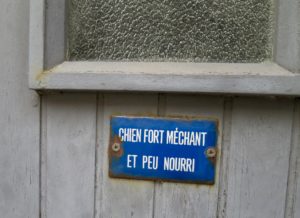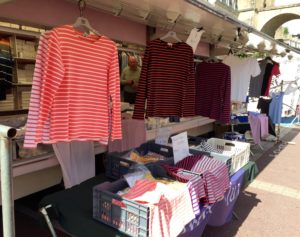 There’s kind of a uniform worn by the people in the town of Carantec. It’s stripes, most often paired with overwashed shorts and footwear worn down as if by the region’s persistent tidal flows. And they probably were.
There’s kind of a uniform worn by the people in the town of Carantec. It’s stripes, most often paired with overwashed shorts and footwear worn down as if by the region’s persistent tidal flows. And they probably were.
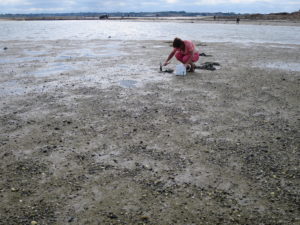 “Ça monte un peu.” The tide’s starting to come in. So says a white-haired woman in cuffed jeans as she scouts the vanishing shoreline. Armed with a soup spoon and bucket, she’s scooping up noble clams that hide just at the top of a charcoal sand layer—or so we’re told by Vincent in his accented English. Vincent’s our fifty-something host—a product of Carantec who carries on a heritage of symbiotic existence with the sea. We pause for a moment to watch the woman work before continuing our mission to stay in good graces with the incoming tide.
“Ça monte un peu.” The tide’s starting to come in. So says a white-haired woman in cuffed jeans as she scouts the vanishing shoreline. Armed with a soup spoon and bucket, she’s scooping up noble clams that hide just at the top of a charcoal sand layer—or so we’re told by Vincent in his accented English. Vincent’s our fifty-something host—a product of Carantec who carries on a heritage of symbiotic existence with the sea. We pause for a moment to watch the woman work before continuing our mission to stay in good graces with the incoming tide.
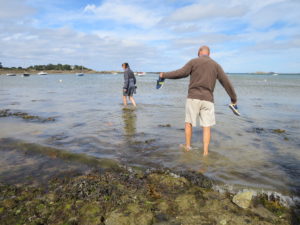 All around us there are boats stranded in accumulating pools of water. The hulls are exposed as nakedly as their moorings that serve no real purpose while on dry land— but after a few days here I know that in less than an hour they’ll prove to be useful. When you’re walking with the changing tide, the water doesn’t seem to be moving that quickly. It’s only when you stop and train your eyes on the shoreline that you see a microcosm of formidable hurry that tells you to respect the shifting waters.
All around us there are boats stranded in accumulating pools of water. The hulls are exposed as nakedly as their moorings that serve no real purpose while on dry land— but after a few days here I know that in less than an hour they’ll prove to be useful. When you’re walking with the changing tide, the water doesn’t seem to be moving that quickly. It’s only when you stop and train your eyes on the shoreline that you see a microcosm of formidable hurry that tells you to respect the shifting waters.
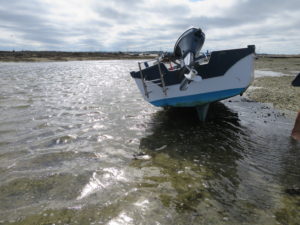 The tide. La marée. Here in this corner of northwestern France, it’s a real overachiever in terms of amplitude. Whether the sea is running away from or towards the granite façades that make this place so notable, the time in transition works like an Etch-A-Sketch reset. The result always offers a completely new composition.
The tide. La marée. Here in this corner of northwestern France, it’s a real overachiever in terms of amplitude. Whether the sea is running away from or towards the granite façades that make this place so notable, the time in transition works like an Etch-A-Sketch reset. The result always offers a completely new composition.
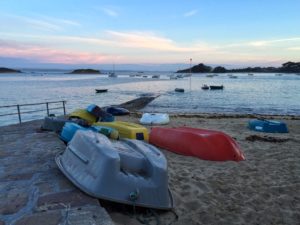 “Je ne m’en lasse pas.” I never get tired of this. I lost count of how many times these words were uttered by locals, and it usually came up while lingering at the water’s edge. I understand the sentiment. Whether you’re out at sea or pulling your car up to the fringes of a Surf Drive parking lot, the faint then suddenly luminous pastels of a sun cycle have a way of spellbinding the recesses of one’s brain. They put everything else in the world on a sort of temporary pause.
“Je ne m’en lasse pas.” I never get tired of this. I lost count of how many times these words were uttered by locals, and it usually came up while lingering at the water’s edge. I understand the sentiment. Whether you’re out at sea or pulling your car up to the fringes of a Surf Drive parking lot, the faint then suddenly luminous pastels of a sun cycle have a way of spellbinding the recesses of one’s brain. They put everything else in the world on a sort of temporary pause.
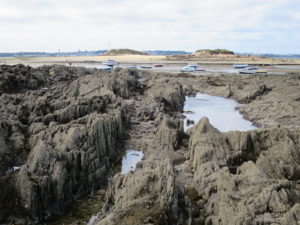 But today we’re at the beach and stumbling around over the course of an overcast mid-afternoon. With shoes in hand, we endeavor to protect our tender soles from the barnacled rocks that are quickly being covered by the Atlantic. Vincent is better at this than us; he seems to careen through the water while we, his American houseguests, do our best to keep up and stay in earshot of his running commentary.
But today we’re at the beach and stumbling around over the course of an overcast mid-afternoon. With shoes in hand, we endeavor to protect our tender soles from the barnacled rocks that are quickly being covered by the Atlantic. Vincent is better at this than us; he seems to careen through the water while we, his American houseguests, do our best to keep up and stay in earshot of his running commentary.
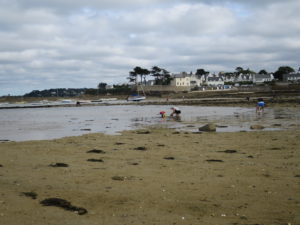 “As a boy, I used to walk to those rocks and do pêche à la main,” he explains while pointing to black clusters peeking out from the wave tops in the distance. “At low tide we’d lift them up and there’d you find dormeurs just sitting there, waiting to be collected.” He carries on in a mixture of French and English, most noticeably going into full-French as he recounts memories he seems most passionate about. Most of these stories involve anecdotes from his Carantec enfance and, even more notably, chronicles of his late father, a French Navy admiral and submarine officer during the Second World War. Between the buffeting wind, his stop-and-go commentary and my negotiation of shifting currents, I feel like I’m part of some kind of 4D IMAX experience.
“As a boy, I used to walk to those rocks and do pêche à la main,” he explains while pointing to black clusters peeking out from the wave tops in the distance. “At low tide we’d lift them up and there’d you find dormeurs just sitting there, waiting to be collected.” He carries on in a mixture of French and English, most noticeably going into full-French as he recounts memories he seems most passionate about. Most of these stories involve anecdotes from his Carantec enfance and, even more notably, chronicles of his late father, a French Navy admiral and submarine officer during the Second World War. Between the buffeting wind, his stop-and-go commentary and my negotiation of shifting currents, I feel like I’m part of some kind of 4D IMAX experience.
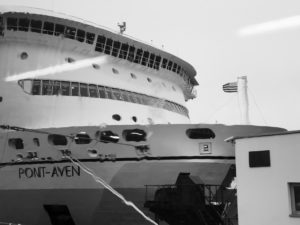 “Les Bretons sont particuliers.” People from Brittany are a bit different.
“Les Bretons sont particuliers.” People from Brittany are a bit different.
This was a characterization I first heard while visiting friends in the Alps. Bretagne, Breizh— or Brittany— as we anglophones call it. They’re a self-distinguishing bunch, and the differences are apparent as soon as you enter their toll-free autoroute and spy vehicles proudly badged with the Gwenn-ha-du. This black and white flag has unmistakable traces of my own country’s ensign, but its roots go back further and have history dating from the thirteenth century.
During my weeklong introduction to Brittany, I quickly came to appreciate the ways in which it asserted its identity. Under the generous hospitality of Vincent and his wife Chris, we got first hand accounts of the inner workings of Carantec. From the seascapes we traced to the humor of the people who called by Vincent’s family house, I heard countless echoes of my home in New England.
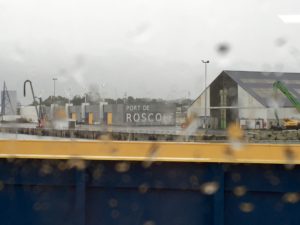 Brittany has its fair share of summer visitors, and in days of sand-in-your-toes expansiveness, it is easy to understand the magnetism. But come November and December, I’m told that the weather here takes a turn for the worst. The ocean and sky work together to throw out fits of self-determination that, in the off-season, drive away all but the unflinching year-rounders. Like at home, the elements are something of an impetuous family member, and growing up in such a household has an effect on a person’s sensibilities. Trust me on this one.
Brittany has its fair share of summer visitors, and in days of sand-in-your-toes expansiveness, it is easy to understand the magnetism. But come November and December, I’m told that the weather here takes a turn for the worst. The ocean and sky work together to throw out fits of self-determination that, in the off-season, drive away all but the unflinching year-rounders. Like at home, the elements are something of an impetuous family member, and growing up in such a household has an effect on a person’s sensibilities. Trust me on this one.
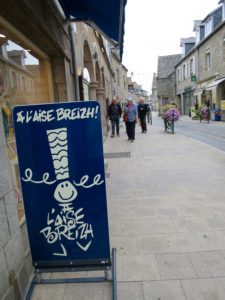 The willingness to weather Mother Nature’s proclivities cultivates a sort of pride and attachment to place. Brittany has its own language, which to me sounds a little funny and is nothing like the pristine French language. At home, we have our own way of speaking English— which to others I suppose might sound wicked weird. It’s almost as if Les Bretons and New Englanders were cousins divided only by language and the broad expanse of the Atlantic Ocean.
The willingness to weather Mother Nature’s proclivities cultivates a sort of pride and attachment to place. Brittany has its own language, which to me sounds a little funny and is nothing like the pristine French language. At home, we have our own way of speaking English— which to others I suppose might sound wicked weird. It’s almost as if Les Bretons and New Englanders were cousins divided only by language and the broad expanse of the Atlantic Ocean.
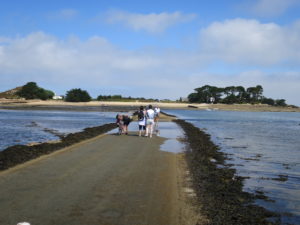 Back on the French side, we stroll across the remaining neck of dry land that includes a paved road is only accessible when the tide is low. For fun, Vincent and other Carantec residents like to loiter at the beach and watch summertime tourists attempt to drive their cars across when the tide is coming in. Visitors don’t appreciate the speed and sudden depth of the water (nevermind what the salt water is doing to their cars). Every now and then a poor soul gets stranded and must abandon ship. With an irrepressible smirk, Vincent tells us that it makes for great theatre. A large part of me loves this flavor of schadenfreude because back at home, I can see us doing the exact same thing.
Back on the French side, we stroll across the remaining neck of dry land that includes a paved road is only accessible when the tide is low. For fun, Vincent and other Carantec residents like to loiter at the beach and watch summertime tourists attempt to drive their cars across when the tide is coming in. Visitors don’t appreciate the speed and sudden depth of the water (nevermind what the salt water is doing to their cars). Every now and then a poor soul gets stranded and must abandon ship. With an irrepressible smirk, Vincent tells us that it makes for great theatre. A large part of me loves this flavor of schadenfreude because back at home, I can see us doing the exact same thing.
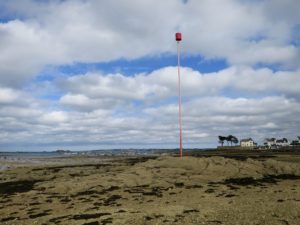 As we’re wrapping up our walk, Vincent suddenly stops and takes stock of our afternoon outing:
As we’re wrapping up our walk, Vincent suddenly stops and takes stock of our afternoon outing:
“I’m sorry that this is not the most exciting thing in the world to do.”
The two of us, both Yanks and products of a lifetime connection to the sea, immediately brush away his apology. To my mind, this kind of thing is the greatest activity in the world. For me the rush of the past months have brought so much self-inflicted noise that my mind and body were desperate for a spring tide that would take everything away and leave me scrubbed clean.
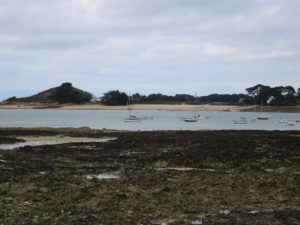 I continue to lift and dip my toes, one in front of the other, noting how the water is now up to my calves. I look back and pan across our route, amazed at how the beached boats are now buoyant. It’s as if they’ve been floating that way for years and years.
I continue to lift and dip my toes, one in front of the other, noting how the water is now up to my calves. I look back and pan across our route, amazed at how the beached boats are now buoyant. It’s as if they’ve been floating that way for years and years.
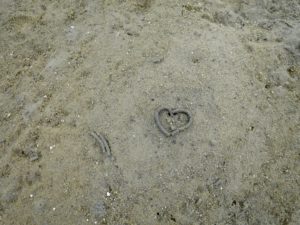 The road has melted away, and the clam diggers are collecting their buckets. Vincent maneuvers to bring us to dry land, and we brush the sand from off our feet before sliding our shoes back on. The wind is really picking up now, and it reminds me that we are at the end of the summer season. As we make our way back home to find Chris, I can only think of how next month I’ll soon be back home, in my own corner of the Atlantic, with my own people.
The road has melted away, and the clam diggers are collecting their buckets. Vincent maneuvers to bring us to dry land, and we brush the sand from off our feet before sliding our shoes back on. The wind is really picking up now, and it reminds me that we are at the end of the summer season. As we make our way back home to find Chris, I can only think of how next month I’ll soon be back home, in my own corner of the Atlantic, with my own people.
The luxury it is to exist by water, there really is nothing better.
